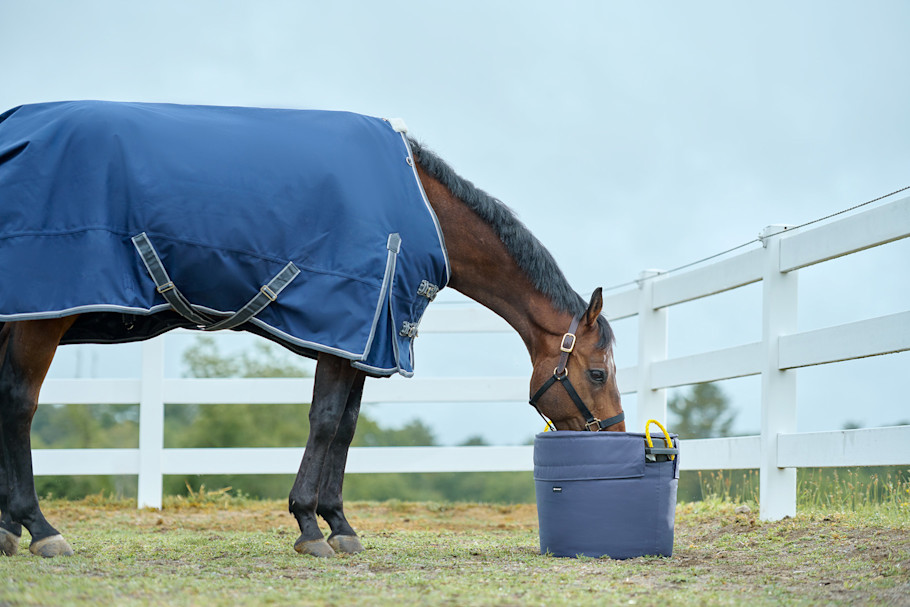Getting Your Horse to Drink Water in Winter
By: Dr. Lydia Gray | Updated March 11, 2025 by SmartPak Equine

"I know during the fall and winter it is a lot easier for horses to become dehydrated. Because of the cooler temperatures, they aren’t as inclined to drink their water as they are in the hotter months. This was the reason my horse got impaction colic last week. It was a very scary experience and I really don’t want it to happen again. What are some ways to encourage horses to drink during the fall and winter months and make sure they stay hydrated, other than keeping fresh water in front of them all the time and providing a salt lick?"
This question gives me a great opportunity to share some ground-breaking research on the topic of horses drinking. I use the term “ground-breaking” even though the research is over 20 years old, because it completely changed what we thought we knew about drinking water preferences in horses.
Research on Horse Drinking Behavior
Using a herd of feral ponies at New Bolton Center, the large animal campus of the School of Veterinary Medicine at the University of Pennsylvania, behaviorist Dr. Sue McDonnell and a team of researchers studied the effects of water temperature on drinking behavior. They wanted to find out if indeed horses drank less water when the weather (and the water) turned cold. What they found was just the opposite of what most horse people have always thought.
In their experiment, they cycled the ponies through three scenarios:
- Offering the single option of warm water only
- Offering the single option of icy cold water only
- Offering both warm and icy cold water simultaneously
During cold weather, horses drank more volume per day of warm water (scenario No. 1) than icy cold water (scenario No. 2). But, when warm water and icy cold water were both available at the same time, horses drank almost exclusively from the cold water, and less of it. That is, horses prefer icy cold water, but they don’t drink as much cold water when compared to warm water.
Dr. McDonnell and her team, as well as other equine behaviorists, aren’t sure why this is so, but horse owners can still use this information to encourage their horses to stay hydrated during the winter.
Practical Tips to Keep Your Horse Hydrated in Winter

If possible, only provide your horse with warm water during the chillier months. Ideally this would be at all times using a heater, but if continuously heated water is not an option, then use another helpful fact from this same study: horses do most of their drinking within three hours after feeding. Continuously heated water in this study ranged from 41 to 140 degrees Fahrenheit with an average of 66 degrees while buckets were refilled twice daily with hot water that ranged from 114 to 120 degrees Fahrenheit and was in the range of 68 to 95 degrees when most drinks occurred.
In addition to providing warm water, two other ways to try and get more fluid into horses in the winter are to give electrolytes containing salt (sodium chloride) to stimulate thirst, and to add water to feeds such as hay, hay pellets and cubes, complete feeds, and beet pulp.
The easiest way to meet the horse’s daily requirement of 1 ounce (about 2 tablespoons) of salt per day is to add it to the grain or the meals listed, but if you do choose to add it to the water, make sure there’s a second bucket of fresh water (with no salt added) available.
And watered-down feed can take some getting used to for many horses so start by just moistening the food and gradually add more and more water until your horse tells you “that’s enough.”
Ask the Vet Video on Getting a Horse to Drink Water in the Winter
In this Ask the Vet video, Dr. Gray explains strategies you can implement at your farm to encourage your horses to drink during the colder months.
Source: Kristula, Michaela A., and Sue M. McDonnell. “Drinking Water Temperature Affects Consumption of Water During Cold Weather in Ponies.” Applied Animal Behaviour Science, vol. 41, no. 3–4, Aug. 1994, pp. 155–60. https://doi.org/10.1016/0168-1591(94)90020-5.